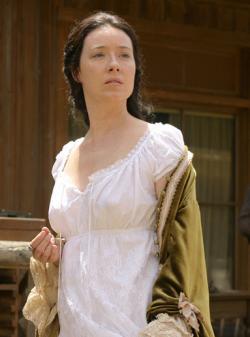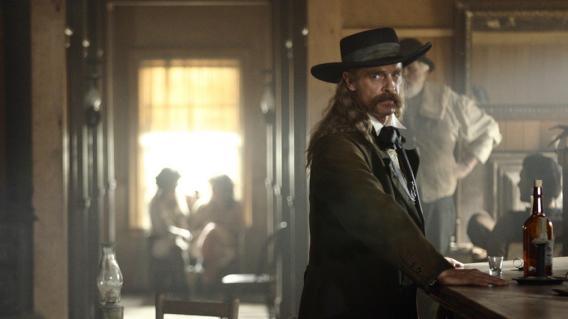Summer is right around the corner—the perfect time to catch up with a few of those shows everyone is always saying you should watch. But there are so many! How can you decide which to try? Pilot episodes have so much introductory work to do; they’re usually subpar compared with the great stuff to come. And the very best episodes of a series often demand too much knowledge of what came before.
You need to find the gateway episode, one you can watch without any background knowledge and which will give you a real sense of the show—and whether you’ll like it. In this weekly Brow Beat series, we direct you to the best gateway episodes for great series you should watch this summer.

Molly Parker.
HBO.
Deadwood has a special place in my heart because it’s one of the only TV shows I managed to watch when my children were little, a time when entertainment mostly lost out to sleep. My husband and I Netflixed the show, and slow-watched it whenever we could spare an hour, always remaining a season or two behind. That’s one of my favorite ways to watch TV, because when you meet other viewers who are late to the same party, it’s as if you’ve found your tribe.
Now I want to persuade you to join us. Since Deadwood is a narrative series—not as tightly written as another favorite of mine, Breaking Bad, but with a clear through line—the simplest thing is to start at the beginning. But the first three episodes plod a bit as they set the characters in place. So here’s another, faster point of entry, if you want to know quickly whether you’re really going to like this show: the fourth episode of the first season, “Here Was a Man.”
The first Deadwood hurdle, for many, is the setting. How do you feel about spending time in an aspiring boomtown of the 1870s, a rough-hewn gold-mining ccamp plunked down on South Dakota land that’s still Indian territory? For me, this took some persuading. I don’t generally cotton to Westerns. But three elements of Deadwood hooked me. First and foremost, the show’s language is an amazing array of riches, both foul-mouthed and poetic. Next come the characters—from Al Swearengen (Ian McShane), the Shakespearean saloon- and brothel-keeper, to Calamity Jane (Robin Weigert), the drunken, gender-bending cowgirl. And finally there’s the grand question at the heart of the show: How do a bunch of outlaws, misfits, and sad sacks build a new society, log by hard-won log? Todd VanDerWerff made a passionate and persuasive case for the series a few years back—if you become a fan, his recaps are a treat.
“Here Was a Man” sets the seasons’ major drama in motion—and intriguingly upends the expectations the show has constructed about two important characters: Alma Garrett (Molly Parker) and Wild Bill Hickock (Keith Carradine). Bill, one of several historical figures on the series, fills the role of wise, impeccably dressed elder. At the beginning of the episode, he cleans out a man in cards—the skulking scoundrel Jack McCall (Garret Dillahunt)—and then tosses him a $1 chip so he’ll have money for breakfast. Is Bill’s gesture magnanimous or high-handed? The answer, we learn, turns on the mores of Deadwood, as Jack understands them.
First, though, the action follows Bill, taking him to the hardware store Seth Bullock (hero to Swearengen’s anti-hero, played by Timothy Olyphant) and his partner Sol Star (John Hawkes) are building. “I’m flat out tired,” Bill tells Seth, who gently reassures him, “Turn in. I got ’er covered.” From the roof of the building he is literally erecting, Seth can indeed look out over the city and keep the night watch. Bill is handing him the torch of leadership, and Seth accepts. It’s a foreshadowing of the climax of the episode, which I won’t give away. Here’s another clue, though: Urged by his dear friend Charlie Utter (Dayton Callie) to begin a new venture, either in Deadwood or elsewhere, Bill shoots back, “Can you let me go to Hell the way I want to?”
The other key plot twist involves the death of Alma’s feckless husband. He’s left town to inspect his gold claim, and he returns as a corpse draped over the back of a horse. Al Swearengen sees Garrett from the saloon window and whispers a profanity. A floor higher, Alma looks out the window of her rented room and takes in the sight of her dead husband through a haze of laudanum. She drifts onto the street in her white dressing gown, the picture of a high-born woman out of place in the low-down street. When Doc Cochran offers her a fresh bottle of laudanum to take the edge off her shock, we assume she’ll succumb.
But if Bill is about to defy our expectation of leadership, Alma is about to surprise us in the opposite direction. She breaks the bottle, signaling that she will end her addiction and the why-me bystander role she’s been playing. Exit Bill and enter Alma. The writers accomplish this by giving the two of them a piece of business—finishing the job of inspecting the Garrett claim—that also pulls in Seth Bullock. Keep watching Deadwood, and you’ll begin to understand how fitting and central this is. Plus, in the next episode, you’ll catch one of the best sermons I’ve seen on TV. It ends with the singing of a hymn that perfectly captures the uncertain promise of this place and its people: “How Firm a Foundation.”
Previous Gateway Episodes
Doctor Who
Buffy the Vampire Slayer
